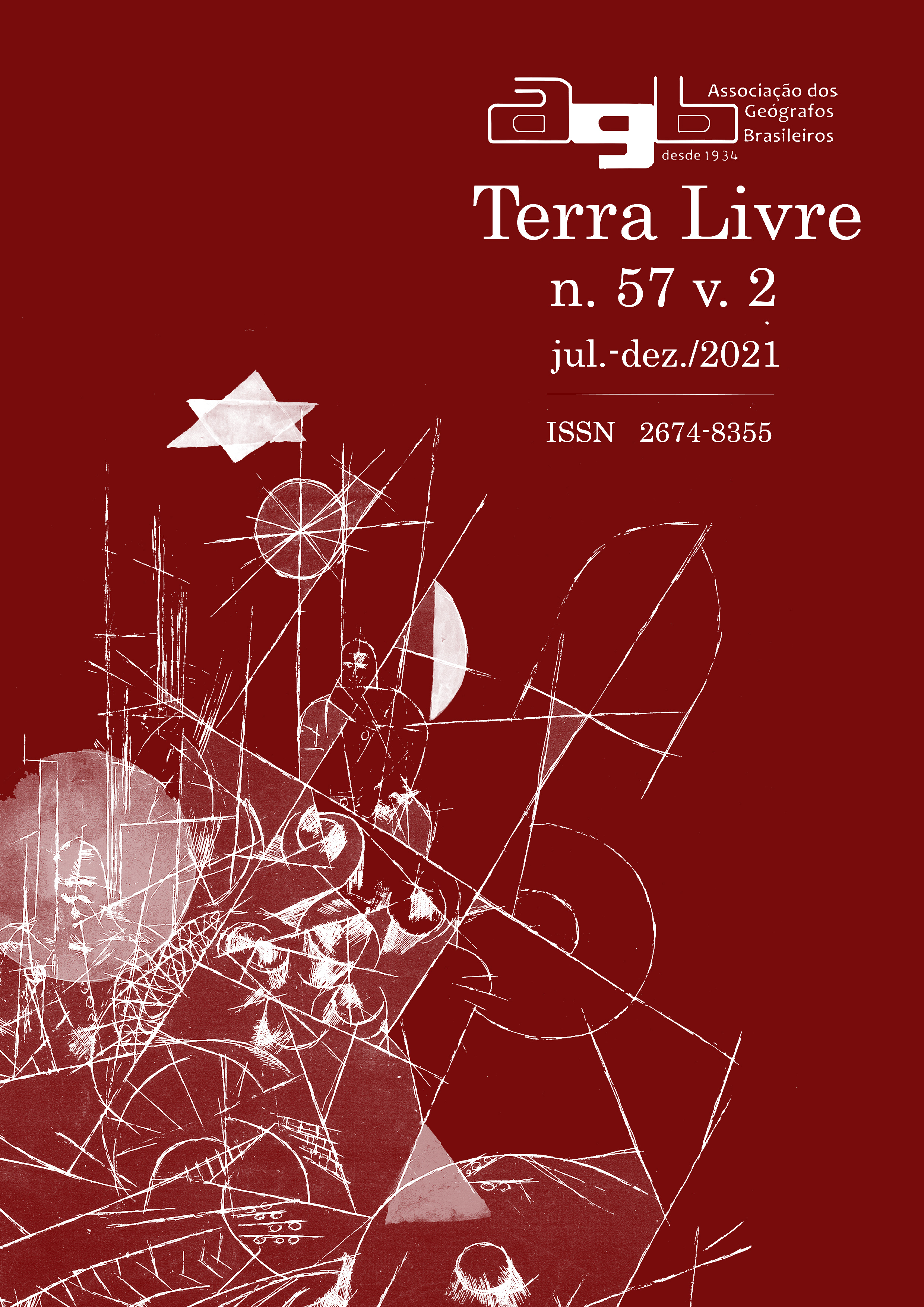Espacios rurales y representaciones de gênero
las bases materiales de la violencia simbólica contra las mujeres rurales gallegas (España) y nordestinas (Brasil)
DOI:
https://doi.org/10.62516/terra_livre.2021.2342Palavras-chave:
espacio rural, mujeres, violenciaResumo
Este artículo analiza la relación existente entre el espacio rural y las representaciones sociales de género. Concretamente, nos interesa entender cómo la dimensión simbólica de dos formas de violencia concretas, la violencia patriarcal y/o de género y la discriminación urbana de lo rural, condicionan la representación social que las mujeres agricultoras tienen de ellas mismas y de la ruralidad. El método cualitativo de investigación es la base del estudio y la entrevista en profundidad, la principal técnica. Las áreas seleccionadas han sido Galicia, en el norte de España y Paraíba, en el noreste de Brasil. Analizamos, las prácticas cotidianas de las agricultoras e identificamos las representaciones sociales que los colectivos de mujeres agricultoras tienen sobre el mundo rural y la presencia de la mujer en él. Los resultados alcanzados nos permiten afirmar que la dimensión simbólica de las diferentes formas de violencia de género y de violencia territorial, que acompañan la historia de vida de estas mujeres, condicionan la construcción de sus representaciones sobre el rural y sobre ellas mismas. Sin embargo, la presencia siempre renovada de mujeres en espacios productivos apunta para una constante re-significación femenina del mundo rural.
Downloads
Referências
Adkins, L., and B. Skeegs (Eds) Feminism after Bourdieu. Oxford: Blackwell Publishing. 2005
Ahmed, S. I am my own person, women’s agency inside and outside the home in rural Pakistan. Gender, Place & Culture. 2019 DOI: https://doi.org/10.1080/0966369X.2019.1664420
Baker, S.L., and R. Edwards (Eds.). How many qualitative interviews is enough? Southampton: National Centre for Research Methods, 2012
Brandth, B., and M.S. Haugen. Rural women, feminism and the politics of identity. Sociologia Ruralis 37(3): 325-344, 1997 DOI: https://doi.org/10.1111/1467-9523.00053
Bourdieu, P. Sur le pouvoir symbolique. Annales Economies, sociétés, civilisations. 32 (3): 405-411, 1977 DOI: https://doi.org/10.3406/ahess.1977.293828
Bourdieu, P. Le sens pratique. Paris: Les Editions de Minuit, 1980
Bourdieu, P. What Makes a Social Class? On the theoretical and practical existence of grous. Berkeley Journal of Sociology 32:1-1, 1998
Burawoy, M. Durable Domination: Gramsci Meets Bourdieu. Unpublished seminar paper. Wisconsin: University of Wisconsin, 2012
Campbell, H., and M. Mayerfeld Bell. The question of rural masculinities. Rural Sociology 65(4):532-546, 2000. DOI: https://doi.org/10.1111/j.1549-0831.2000.tb00042.x
Celentano, D. Cooperating as peers: Labor justice between distributive and relational equality. PhD Thesis, University of Catania. 2019. Available at: http://archivia.unict.it/bitstream/10761/4106/1/CLNDNS87P58H224X-Tesi_Denise%20Celentano-compressedA.pdf
Chárriez Cordero, M. Historias de vida: Una metodología de investigación cualitativa. Revista Griot, 5(1), 50-67, 2012. Disponível em: https://revistas.upr.edu/index.php/griot/article/view/1775
Charmaz, K. Constructing grounded theory. A practical guide through qualitative analysis. London: Sage, 2006
Cloke, P. Conceptualizing rurality. In P. Cloke, T. Marsden, and P.H. Mooney (Eds.) Handbook of Rural Studies, London: Sage, pp. 18-28, 2006 DOI: https://doi.org/10.4135/9781848608016.n2
Cordeiro, R & Scott, P. Mulheres em áreas rurais nas regiões Norte e Nordeste do Brasil. Revista Estudos Feministas, 15(2), 419- 424, 2007 DOI: https://doi.org/10.1590/S0104-026X2007000200008
Conway, S.F., J. McDonagh, M. Farrell and A. Kinsella. Uncovering obstacles: The exercise of symbolic power in the complex arena of intergenerational family farm transfer. Journal of Rural Studies. 54: 60-75, 2017 DOI: https://doi.org/10.1016/j.jrurstud.2017.06.007
European Commission. Poverty and social exclusion in rural areas. Report available at Google Scholar, 2017
Ferreira, A.P. and L.C. Mattos. Convergências e divergências entre feminismo e agroecologia. Revista Ciência e Cultura 69(2), 38-4, 2017 DOI: https://doi.org/10.21800/2317-66602017000200013
Galtung, J. Cultural violence. Journal of Peace Research 27(3): 291-305, 1990 DOI: https://doi.org/10.1177/0022343390027003005
Hennink, M.M., B.N. Kaiser, and V.C. Marconi. Code saturation versus meaning saturation: How many interviews are enough? Qualitative Health Research 27(4): 591-608, 2017 DOI: https://doi.org/10.1177/1049732316665344
Juska, A., A. Poviliunas, and R. Pozzuto. Resisting Marginalisation: The Rise of the Rural Community Movement in Lithuania. Sociologia Ruralis 45(1-2): 3-21, 2017 DOI: https://doi.org/10.1111/j.1467-9523.2005.00287.x
Kasabov, E. Ignored, silenced, caricatured, ridiculed, patronised, and hijacked: What
next for a post-populist, post-Gilded-Age countryside? Journal of Rural Studies 75:143-151, 2020 DOI: https://doi.org/10.1016/j.jrurstud.2020.01.019
Little, J. Gender and sexuality in rural communities. In P. Cloke, T. Marsden, and P.H. Mooney (Eds.) Handbook of Rural Studies, London: Sage, pp. 365-378, 2006 DOI: https://doi.org/10.4135/9781848608016.n26
Little, J. The development of feminist perspectives in rural gender studies. In B. Pini, B.
Brandth and J. Little. (Eds.) Feminisms and Ruralities, ed., Lanham: Lexington Books, 107-118, 2015
Little, J. Understanding domestic violence in rural spaces: A research agenda. Progress in Human Geography 41(4): 472-488, 2017 DOI: https://doi.org/10.1177/0309132516645960
Little, J., and O. Jones. Masculinity, gender, and rural policy. Rural Sociology 65(4): 621-639, 2000 DOI: https://doi.org/10.1111/j.1549-0831.2000.tb00047.x
Martínez García, M. Á., & Camarero, L. A. La reproducción de la Violencia de Género: una lectura desde las áreas rurales. Ager. Revista de Estudios sobre Despoblación y Desarrollo Rural, (19), pp.1-30, 2015
Massey, D. Space, place and gender. Cambridge: Polity Press, 1994
McCall, L. Does gender fit? Bourdieu, Feminism and Conceptions of Social Order. Theory and Society 21(6): 837-867, 1992 DOI: https://doi.org/10.1007/BF00992814
McLeod, J. Feminists re-reading Bourdieu: Old debates and new questions about gender habitus and gender changes. Theory and Research in Education 2(1): 11-30, 2005 DOI: https://doi.org/10.1177/1477878505049832
Moi, T. Appropriating Bourdieu: Feminist Theory and Pierre Bourdieu's Sociology of Culture. New Literary History 22:107-1049, 1991 DOI: https://doi.org/10.2307/469077
Moukarbel, N. Sri Lankan housemaids in Lebanon. A case of ‘symbolic violence’ and ‘everyday forms of resistence’ Amsterdam. Amsterdam University Press, 2009 DOI: https://doi.org/10.5117/9789089640512
Pini, B. Brandth and J. Little. (Eds.) Feminisms and Ruralities, ed., Lanham: Lexington Books, 1-12, 2015
Saugeres, L. The cultural representation of the farming landscape: masculinity, power and nature. Journal of Rural Studies 18:373-384, 2002 DOI: https://doi.org/10.1016/S0743-0167(02)00010-4
Seid, G. Procedimientos para el análisis cualitativo de entrevistas. Una propuesta didáctica. Proceedings of the V Encuentro Latinoamericano de Metodología de las Ciencias Sociales, Mendoza (Argentina). 2016. Disponível em: http://www.memoria.fahce.unlp.edu.ar/trab_eventos/ev.8585/ev.8585.pdf
Shucksmith, M. Class, Power and Inequality in Rural Areas: Beyond Social Exclusion? Sociologia Ruralis 52(4): 377-397, 2012 DOI: https://doi.org/10.1111/j.1467-9523.2012.00570.x
Shortall, S, A. McKee and L-A, Sutherland.The Performance of Occupational
Closure: The Case of Agriculture and Gender. Sociologia Ruralis 60(1): 40-57, 2019 DOI: https://doi.org/10.1111/soru.12279
Siliprandi, E. Mulheres e agroecologia: transformando o campo, as florestas e as pessoas. Rio de Janeiro: UFRJ Press, 2015
Springer, S. Violence sits in places? Cultural practice, neoliberal rationalism, and virulent imaginative geographies. Political Geographies 30: 90-98, 2011 DOI: https://doi.org/10.1016/j.polgeo.2011.01.004
Swartz, D.L. Symbolic power, politics and intellectuals. The political sociology of Pierre Bourdieu. Chicago: The University of Chicago Press, 2013 DOI: https://doi.org/10.7208/chicago/9780226925028.001.0001
Woods, M. Rural Geography: Processes, responses and experiences in rural restructuring. London: Sage, 2005
Tyner, J., and Inwood, J. Violence as fetish: Geography, Marxism, and Dialects. Progress in Human Geography 38(6): 771-784, 2014 DOI: https://doi.org/10.1177/0309132513516177
Young, I. Justice and the politics of difference. Princeton, New Jersey: Princeton University Press, 1990
Downloads
Publicado
Como Citar
Edição
Seção
Licença
Esta Revista está licenciado sob uma licença 
Os Direitos Autorais dos artigos publicados na Terra Livre pertencem ao(s) seu(s) respectivo(s) autor(es), com os direitos de primeira publicação cedidos à Terra Livre.
Os artigos publicados são de acesso público, de uso gratuito, com atribuição de autoria obrigatória, para aplicações de finalidade educacional e não-comercial, de acordo com o modelo de licenciamento Creative Commons 3.0 adotado pela revista.

A Terra Livre está licenciada sob uma licença Creative Commons Atribuição-NãoComercial-CompartilhaIgual 3.0 Não Adaptada.
Você é livre para:
- Compartilhar — copie e redistribua o material em qualquer meio ou formato
- Adaptar — remixar, transformar e construir sobre o material
- O licenciante não pode revogar essas liberdades, desde que você siga os termos da licença.
Nos seguintes termos:
- Atribuição — Você deve dar o crédito apropriado , fornecer um link para a licença e indicar se as alterações foram feitas . Você pode fazê-lo de qualquer maneira razoável, mas não de qualquer forma que sugira que o licenciante endossa você ou seu uso.
- Não Comercial — Você não pode usar o material para fins comerciais .
- ShareAlike — Se você remixar, transformar ou construir sobre o material, você deve distribuir suas contribuições sob a mesma licença que o original.
- Sem restrições adicionais — Você não pode aplicar termos legais ou medidas tecnológicas que restrinjam legalmente outras pessoas de fazer qualquer coisa que a licença permita.












